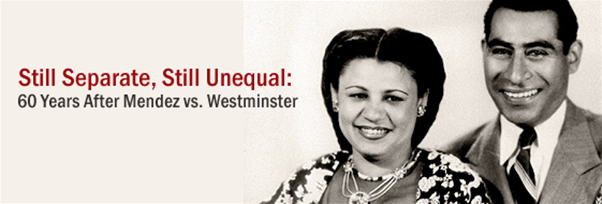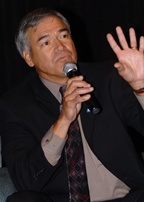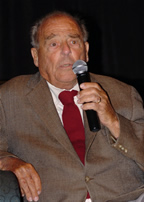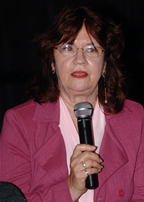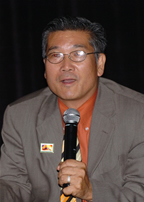Stopping Segregation
Panel discusses significance of the Mendez vs. Westminster case
September 24, 2007
By Mimi Ko Cruz
In 1943, Sylvia Mendez went to school with other Mexican Americans. She wasn't allowed to attend the whites-only school in her neighborhood.
Schools all across the nation were segregated and it took a lawsuit by Sylvia's parents, Gonzalo and Felicitas Mendez, and others to desegregate public schools in Orange County. The 9th Circuit U.S. Court of Appeals in San Francisco ruled on April 14, 1947 that school districts could not segregate on the basis of race.
The ruling and how it influenced other cases — including Brown vs. Board of Education — was the topic of a Sept. 18 panel discussion "Still Separate, Still Unequal: 60 Years After Mendez vs. Westminster" on campus.
The panelists — Orange County Superior Court Judge Frederick P. Aguirre; retired Los Angeles County Superior Court Judge Paul Egly; Mikel Hogan, chair and professor of human services and field director for the Office of Civil Rights and State Department of Education; and Michael Matsuda, co-author of a children's book about the Mendez vs. Westminster case and a trustee of the North Orange County Community College District — spoke about the historic case and its relevance today.
“America has been a country that has struggled with its identity,” Matsuda said. “It comes down to how you treat others…. In the Mendez case, the parents only considered what was right to do.”
Matsuda called the case “a truly heroic American story” and challenged audience members to call their legislators to demand the case be taught to children as part of their grade-school curriculum.
Sixty years ago, more than 500,000 Mexican Americans fought in World War II as U.S. soldiers, Aguirre said. Mexican Americans were good enough to fight and die alongside Anglos, yet their children were not good enough to go to the same schools, he said.
There “was no reason for segregation,” Egly said, but “California was and still is a racist state.”
“People are afraid of people who are different, and until we get over that fear, we are going to have this problem,” Aguirre added. “The equality that we’re working for is equality of opportunity.”
In light of a recent UCLA civil rights project that found schools are resegregating faster than they have since the 1990s when Supreme Court cases started dismantling desegregation policies, Hogan said raising awareness in schools and calling on elected officials to fund desegregation programs are “important to social justice and equality.”
The Supreme Court’s 5-4 decision in June, restricting any action by school districts to diversify schools, “resurfaced the need to educate our community about the Mendez case that set a precedent for the Brown vs. Board of Education to desegregate schools through our nation,” said Mark Kamimura-Jiménez, campus director of educational partnerships and one of the event’s organizers. “Only 60 years ago, California desegregated its schools; however, today we are faced with new challenges in our schools as diversity remains an empirical component to an enriched learning environment.”
The panelists, Kamimura-Jiménez said, engaged attendees “in a critical public dialogue on the historical and present issues of segregation in our schools and communities, and encouraged us to think about the implications of the Mendez decision.”
Hena Cuevas, a reporter on KCET’s “Life and Times” program, moderated the panel, which commenced after an unveiling of a new U.S. Post Office commemorative stamp honoring the 60th anniversary of the Mendez case.
The panel discussion, sponsored by Associated Students Inc., Student Affairs and Public Affairs and Government Relations, was part of last week's Constitution Day activities.

